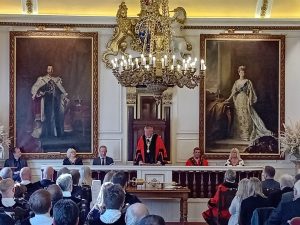
Current Vacancies August 2024:
- Bray – 1 seat available
- Holyport – 2 seats available
- Oakley Green and Fifield – 1 seat available
Being a local Councillor can be a very rewarding role for those with a community spirit.
There is no salary that goes with the role, it’s voluntary but it enables you to meet with the local community and decision makers to discuss topics that are important to local people.
You have to be over 18 years of age to be a local Parish Councillor and there are a few other eligibility criteria, see below.
The role is perfect for those:
- Studying politics at A level. Being a local Parish Councillor would give you an insight into the workings of local government.
- Parents looking to add value to the community around managing parental responsibilities.
- Adults where climbing the career ladder has lost its shine and they’d like to add value to the local community. Some of the more gifted around us combine the two!
- Of a certain age, with time on their hands, who just want to add value to the local community. Being a local Parish Councillor is a way to do that.
Below is some information you might find useful before making an application.
Your can complete the online application form or call into the Parish office and ask for a paper form.
INDIVIDUAL COUNCILLORS HAVE NO DECISION-MAKING POWER
In general, an individual Councillor has no authority to make decisions on behalf of the council. Decisions are made at Main Council meetings when all the Councillors come together and discuss agenda items. They then vote on an item and the majority vote determines the decision and Councillors agree on how to proceed.
This is the purpose of the mace used at Council meetings to underline that it is the coming together of councillors around the mace at meetings lead by the Mayor as the first citizen, where decisions can be made on behalf of the council.

THE ROLE OF THE COUNCILLOR
A councillor’s primary role is to represent their ward or division and the people who live in it. Councillors provide a bridge between the community and the council. As well as being an advocate for local residents and signposting them to the right people at the council, you will need to keep them informed about the issues that affect them.
In order to understand and represent local views and priorities, you need to build strong relationships and encourage local people to make their views known and engage with you and the council. Good communication and engagement are central to being an effective councillor.
As a local councillor, your residents will expect you to:
- respond to their queries and investigate their concerns (casework)
- communicate council decisions that affect them
- know your patch and be aware of any problems
- know and work with representatives of local organisations, interest groups and businesses
- represent their views at council meetings
- lead local campaigns on their behalf
- act and conduct yourself in a manner that is appropriate for your role.
Find out more…
https://www.local.gov.uk/our-support/online-and-hybrid-meetings/councillor-hub/role-councillor
https://www.nalc.gov.uk/library/our-work/civility/3802-roles-and-responsibilities-guidance/file
https://www.nalc.gov.uk/library/publications/4076-the-good-councillor-s-guide-2024/file
THE NOLAN PRINCIPLES
It is generally accepted that the “Nolan Principles” form the basis of the ethical standards expected of public office holders.
https://www.gov.uk/government/publications/the-7-principles-of-public-life
- The Seven Principles of Public Life
The Seven Principles of Public Life (also known as the Nolan Principles) apply to anyone who works as a public office-holder. This includes all those who are elected or appointed to public office, nationally and locally, and all people appointed to work in the Civil Service, local government, the police, courts and probation services, non-departmental public bodies (NDPBs), and in the health, education, social and care services. All public office-holders are both servants of the public and stewards of public resources. The principles also apply to all those in other sectors delivering public services.
1.1 Selflessness
Holders of public office should act solely in terms of the public interest.
1.2 Integrity
Holders of public office must avoid placing themselves under any obligation to people or organisations that might try inappropriately to influence them in their work. They should not act or take decisions in order to gain financial or other material benefits for themselves, their family, or their friends. They must declare and resolve any interests and relationships.
1.3 Objectivity
Holders of public office must act and take decisions impartially, fairly and on merit, using the best evidence and without discrimination or bias.
1.4 Accountability
Holders of public office are accountable to the public for their decisions and actions and must submit themselves to the scrutiny necessary to ensure this.
1.5 Openness
Holders of public office should act and take decisions in an open and transparent manner. Information should not be withheld from the public unless there are clear and lawful reasons for so doing.
1.6 Honesty
Holders of public office should be truthful.
1.7 Leadership
Holders of public office should exhibit these principles in their own behaviour and treat others with respect. They should actively promote and robustly support the principles and challenge poor behaviour wherever it occurs.
ELIGIBILITY CRITERIA
A person is eligible to be co-opted provided he is qualified to be a councillor (see s.79 of the 1972 Act) and is not disqualified by s.80 of the 1972 Act. The following is taken from National Association of Local Councils June 2020 LTN 8 Elections and Co-Option.
Qualifications for election and holding office as a councillor
- Section 79(1) of the Local Government Act 1972 (“the 1972 Act”) provides, unless disqualified (see paragraph 7 below) a person is qualified to be elected and to be a councillor if he is a qualifying Commonwealth citizen or an EU citizen and on the day on which he is nominated and, if there is a poll, the day of the election he is 18 years of age or over and
- a) on that day he is and thereafter he continues to be a local government elector for the area of the authority; or
- b) he has during the whole of the 12 months preceding that day occupied as owner or tenant any land or other premises in that area; or
- c) his principal or only place of work during that 12 months has been in that area; or
- d) he has during the whole of those 12 months resided in that area; or
- e) in the case of a member of a parish or community council he has during the whole of those 12 months resided either in the parish or community or within three miles of it. [The Electoral Commission’s interpretation of this provision (namely section 79(1)(e) of the 1972 Act) is that all persons qualify to be elected and to be a member of a parish or community council if they have resided for the relevant 12 months in the parish or community or within three miles of it.]
- A person is a qualifying Commonwealth citizen if he is a Commonwealth citizen who either:
- a) is not a person who requires leave under the Immigration Act 1971 (“the 1971 Act ”) to enter or remain in the United Kingdom, or
- b) is such a person but for the time being has (or is, by virtue of any enactment, to be treated as having) indefinite leave to remain within the meaning of the 1971 Act.
- A person is not a qualifying Commonwealth citizen if he does not require leave to enter or remain in the United Kingdom by virtue only of section 8 of the 1971 Act (exceptions to requirement for leave in special cases).
- A person is qualified for re-election under paragraph 3(c) if he is already a councillor. The Court of Appeal held in Parker v Yeo (1992) that being a councillor was “work” and that the work was carried on in the area where the councillor was an elected member.
Disqualifications for election and holding office as a councillor
- In accordance with section 80 of the 1972 Act, a person is disqualified from being elected or being a councillor if he:
- a) holds any paid office or employment (other than the office of chairman, vice chairman or deputy chairman) to which he has been appointed by the council or any committee or sub-committee of the council, or by a paid officer of the council, or by any joint committee on which the council is represented; or
- b) is the subject of a bankruptcy restrictions order, an interim bankruptcy restrictions order, a debt relief restrictions order or an interim debt relief restrictions order under Schedule 4ZB of the Insolvency Act 1986;
- c) has within five years before the day of election or since his election been convicted of any offence and sentenced to a term of imprisonment of at least three months (whether suspended or not) without the option of a fine; or
- d) has been found guilty of corrupt or illegal practices, or was responsible for incurring unlawful expenditure and the court orders his disqualification.
Your can complete the online application form or call into the Parish office and ask for a paper form.
